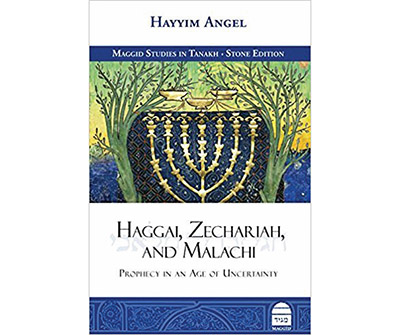
Reviewing: “Haggai, Zechariah, and Malachi: Prophecy in an Age of Uncertainty,” Rabbi Hayyim Angel, Maggid Books. ISBN:978-1592644131.
There’s an old joke, that one yeshiva student asked another what the Prophets and Writings are. The other replied, “I’m not sure, but it’s quoted in the Talmud all the time.”
While the joke may be corny, it does reflect a reality that many people are not familiar with the books of the prophets. In “Haggai, Zechariah, and Malachi: Prophecy in an Age of Uncertainty” Rabbi Hayyim Angel, National Scholar of the Institute for Jewish Ideas and Ideals, has written a remarkable work that brings the wisdom of these three prophets to life.
The uncertainty in the title refers to the times in which these prophets lived, just after the fall of the second Temple. With the destruction of the Temple, the general outlook of the populace was that Judaism was dead, and there was no future for the Jewish people without a holy Temple. A Judaism without a Temple was something that was simply incomprehensible and unfathomable to them. It was a like a body without a heart. The populace understood the destruction of the Temple and the exile to Babylon to be a cessation of their covenantal relationship with God.
With that, it was Jeremiah and Ezekiel who worked to combat that mistaken belief. And it was the prophets Haggai, Zechariah and Malachi who came later who took the people out of their malaise, and preached to them of a future redemption.
Haggai, Zechariah and Malachi preached at a time when Israel was no longer an independent nation with its own king, but rather a small vassal state within the huge Persian empire. As very small fish within a huge Persian pond, most Jews didn’t see any future for the devastated Jewish nation.
In 150 pages, Angel provides context to the human experience of the time. He cogently details the dread that overtook the Jewish nation during those horrendous times.
At a scant 38 verses, Haggai reflects the recorded prophecies he said over a four-month period during the second year of the reign of Darius (520 BCE). Haggai succeeded in inspiring a demoralized people to resume their building of the Second Temple after a lengthy delay.
As to the book of Zechariah, most of it consists of esoteric prophecies of redemption; Angel does a good job of making sense of the cryptic nature of this book. He notes that some of the things Zechariah prophesized about must have been evident to his audience, but remain obscure to us.
The message of Malachi was much more subdued than the optimism of Haggai. While Haggai preached that redemption was near, Malachi spoke of the new reality: that although they had longed for the redemption, they knew it was not at hand.
As the last of the prophets, Malachi knew that he was needed to help the people transition to the era where the oral law and the rabbis would be the dominant figures in Jewish life. They would in effect replace where the Temple once stood. The message of Malachi was that with the cessation of prophecy, the Torah will become the sole means of hearing the revealed word of God.
The most dramatic insight Angel brings is that although the loss of prophecy was a terrible blow for the Jewish nation, there were actually spiritual benefits to its suspension. He notes that the people were now able to accept the Torah out of pure free will, rather than via prophetic compulsion.
The loss of prophecy also led to the development and expansion of the oral law. Rather than running to the prophets for answers, the people ran to the rabbis. Finally, prayer took hold during this era. And people were now able to better use prayer in their religious experience, taking an active responsibility for keeping the lines of dialogue with God alive.
While there are but 19 chapters of text from these, the last of the prophets, Angel does a fine job of extracting deep insights from them. He provides the reader with an understanding of the devastation of the times.
Angel shows that the message of these prophets from long ago is still relevant today. Topics such as identity and redemption are indeed timely. In this short but most insightful monograph, Angel does a superb job of bringing these lesser-known prophets to light, and ensuring their timeless messages are still heard today.
By Ben Rothke










